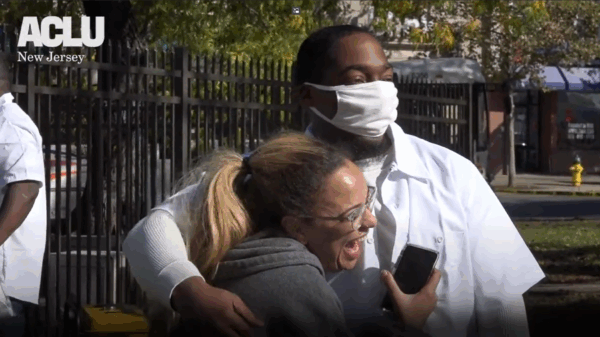A first-of-its-kind law went into effect today in New Jersey implementing groundbreaking public health emergency credits, which will allow for the early release of incarcerated people nearing the end of their sentences during the public health crisis of COVID-19.
Throngs of New Jersey organizations and community members across the state welcomed people as they were released to provide initial support as they rejoin the outside world. Today’s homecomings represent one of the most significant days in criminal justice reform during the pandemic.
More than 2,200 people, who were due to have their sentences end within eight months, will now have opportunities to socially distance outside of prison, and people living and working inside prisons will have greater ability to prevent contracting the virus.
The United States has the highest rate of incarceration, and it falls along color lines. New Jersey has the country’s highest Black-white disparity in rates of imprisonment – twelve to one – and the country’s highest rate of recorded deaths from COVID-19 in prison.
The following statement can be attributed to ACLU-NJ Executive Director Amol Sinha:
“This law is one of the most significant criminal justice policies passed during the pandemic, and the releases today mark a groundbreaking, game-changing moment nationwide for public health and criminal justice reform overall. Leaders and community members around the country are looking at New Jersey as a roadmap for addressing the public health dangers and human costs of incarceration during the pandemic.
“The pandemic has forced lawmakers to reckon with our failing system of mass incarceration, and, thanks to the leadership of Gov. Phil Murphy and the New Jersey Legislature, our state has taken meaningful action to address this crisis head-on. While lawmakers throughout America almost universally recognize the need for criminal justice reform, rarely do they take the necessary steps to dismantle the injustices that we know are pervasive – and now, New Jersey demonstrates how it can be done. This law will have an ongoing, long-term decarcerative impact that can begin to address some of the worst injustices of our reliance on mass imprisonment.
“New Jersey has the highest COVID-19 death rate in the country in its prisons, along with the country’s highest Black-white disparity in incarceration rates, amounting to a racial justice and human rights crisis. This law deals a blow to mass incarceration, as it will reduce New Jersey's prison population by over 35 percent, a population that is disproportionately Black. It is a matter of racial justice.”
Related Content

COVID-19: What It Means For Your Rights
Stay Informed
Sign up to be the first to hear about how to take action.
By completing this form, I agree to receive occasional emails per the terms of the ACLU’s privacy statement.
By completing this form, I agree to receive occasional emails per the terms of the ACLU’s privacy statement.

